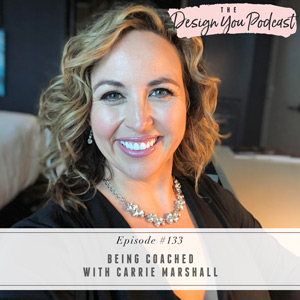
I have a different type of episode for you this week, friends. Everybody thinks that as life coaches, we have it all figured out in terms of mindset. But the truth is, we’re all human and we all struggle from time to time. So, this week, you’re going to hear me working through an issue I’ve faced recently, as I’ll be coached live on the episode by fellow certified life coach, Carrie Marshall. Really cool, right?!
Carrie is a certified life coach through The Life Coach School and works with men to help them improve and manage their mindset. She has recently joined Design You as a fellow Life Coach and is here today to help coach me through some issues I’ve been facing recently.
Join us this week where we discuss all things mindset, and discover how to work through issues of self-judgment, self-criticism, and negativity. We discuss the importance of unconditional self-love and explain why the biggest expense in our lives and becoming better versions of ourselves is a lack of action. I feel so much better after this episode, friends, and I know you’ll find value in what we discuss.
If you’ve enjoyed listening to me being coached today and would like to be coached by either myself or Carrie, then get your buns over to the Design You Coaching Program! We only enroll a few times a year, so be sure to sign up for the waiting list ASAP to be notified when we next open our doors!
If you want to keep this conversation going, you have to join my free Design You Podcast community on Facebook. We have great conversations over there about the podcast episodes and our podcast guests are in there too! So head on over and I’ll see you there!





